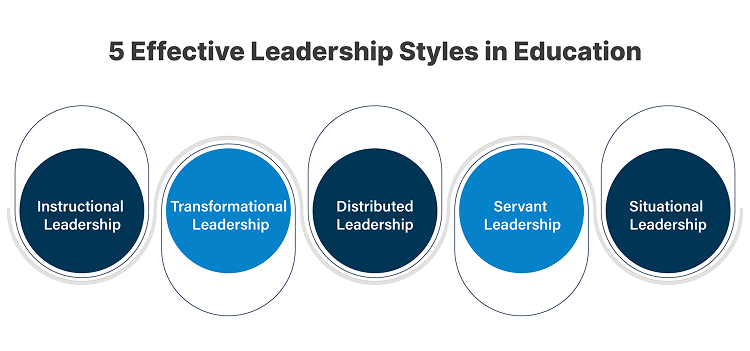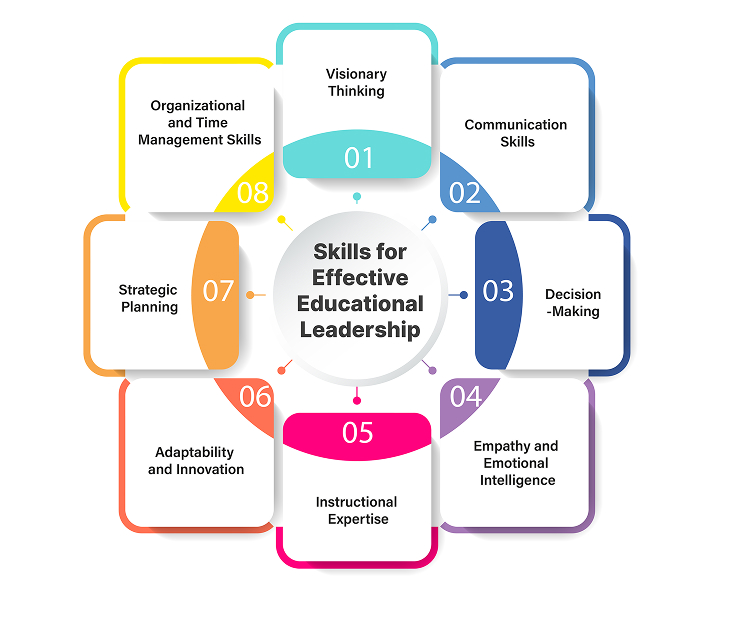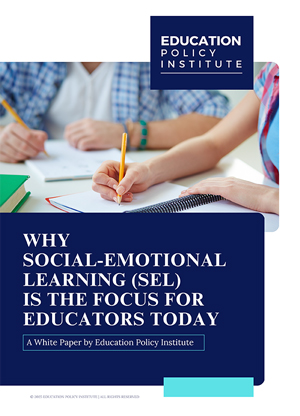In the dynamic world of education, the importance of strong school leadership cannot be overstated. Today’s school leaders are more than just administrative figures; they are visionaries who influence the academic, emotional, and social well-being of both students and staff. With mounting expectations from communities, governments, and global benchmarks, effective school leadership has become the cornerstone of educational progress.
School leaders are expected to navigate an increasingly complex environment involving curriculum shifts, equity concerns, staff development, and student outcomes. They must build cohesive teams, champion innovation, and ensure accountability—all while maintaining a student-centered approach. This article explores what makes school leaders truly effective, looking into the reasons leadership matters, the leadership styles that work best in education, and the critical skills required to lead a school successfully.
Why Leadership in School Matters?
Leadership plays a critical role in shaping a school’s culture, climate, and overall effectiveness. Research consistently shows that next to classroom instruction, leadership is the most significant school-related factor influencing student achievement. Effective leaders impact everything from student discipline and teacher satisfaction to curriculum implementation and parent engagement.
A strong leader ensures that a school's vision is not just a statement on paper but a guiding principle influencing daily decisions. They create alignment between goals, teaching strategies, and student needs. Additionally, effective school leaders provide a sense of stability and direction, especially during times of change or crisis. This influence extends beyond academics, affecting teacher retention, professional development, and the overall morale within the school community.
Moreover, school leaders serve as mediators between educational policy and classroom practice. They interpret national or district mandates in a way that aligns with their school’s unique context. By doing so, they help educators remain focused on student success rather than getting lost in bureaucratic demands.
Most Effective Leadership Styles in Education
There is no one-size-fits-all approach to leadership in education, but certain styles have consistently proven to be more effective than others. These include instructional, transformational, distributed, servant and situational leadership models.

1. Instructional leadership: focuses primarily on curriculum, instruction, and academic outcomes. Leaders who adopt this style work closely with teachers to improve teaching methods and student performance. They frequently engage in classroom observations, lead professional development, and use data to guide school improvement efforts.
2. Transformational leadership: on the other hand, emphasizes inspiring and motivating staff through a shared vision. These leaders build a sense of purpose among staff, encouraging collaboration and continuous improvement. They tend to empower others to become leaders themselves, creating a ripple effect of positive change throughout the school.
3. Distributed leadership: takes a more collaborative approach by involving multiple individuals in the leadership process. Rather than relying on a single figure, leadership responsibilities are shared among teachers, department heads, and even students. This inclusive model promotes ownership and accountability across the school community.
4. Servant Leadership: Rooted in empathy and support, servant leaders prioritize the needs of their team and students. They focus on building trust, promoting well-being, and creating a culture of care.
5. Situational Leadership: Effective leaders know when to be directive and when to be collaborative. Situational leaders adjust their approach based on the maturity and readiness of their team, which allows for flexibility and responsiveness.
Effective leaders often draw from multiple styles, adapting their approach to meet specific needs and challenges. Flexibility and emotional intelligence are key to knowing when and how to apply different leadership strategies.
Skills for Effective Educational Leadership
Being an effective school leader requires a diverse skill set that goes beyond academic knowledge or managerial competence. At the core are strategic thinking, strong communication, decision-making, and empathy.

01. Visionary Thinking: A leader must be able to articulate a compelling vision that inspires action. They need to communicate this vision clearly and consistently while making sure it reflects the community’s values and the school’s specific context.
02. Communication Skills: Clear and consistent communication is essential for building trust and ensuring transparency. Leaders must be able to listen actively, provide constructive feedback, and effectively engage with students, staff, parents, and the wider community.
03. Decision-Making: School leaders are frequently faced with complex decisions that require balancing the interests of various stakeholders. Strong leaders use data and input from their teams to make informed, ethical decisions that benefit students.
04. Empathy and Emotional Intelligence: Understanding the perspectives and emotional states of students and staff is vital. Leaders who demonstrate empathy create a safe and supportive school climate that promotes well-being and learning.
05. Instructional Expertise: Effective leaders possess a deep understanding of pedagogy and assessment. They support teachers in refining instructional strategies, selecting resources, and aligning curriculum with learning outcomes.
06. Adaptability and Innovation: In a rapidly changing world, leaders must be comfortable with change and open to trying new approaches. Whether implementing new technologies or responding to crises, adaptability is crucial.
07. Strategic Planning: The ability to develop actionable plans, set priorities, and manage resources is essential. Strategic planning ensures that the vision is not only aspirational but also achievable.
08. Organizational and Time Management Skills: Managing multiple responsibilities and limited resources is a constant challenge. Leaders must be able to prioritize tasks, delegate appropriately, and maintain focus on long-term goals.
Overcoming Leadership Challenges in Schools
Even the most skilled leaders encounter obstacles. Budget constraints, staff shortages, policy mandates, and societal pressures can complicate decision-making. Additionally, balancing administrative duties with instructional leadership requires excellent time management and delegation skills.
Resistance to change is another common challenge. Whether introducing a new teaching method or revising disciplinary procedures, leaders must anticipate pushback and build consensus. Engaging all stakeholders in the decision-making process helps mitigate resistance.
Emotional burnout is also a concern. The weight of responsibility, constant problem-solving, and emotional labor can take a toll. Leaders must prioritize their well-being, seek peer support, and model a healthy work-life balance for staff.
Effective leaders recognize these challenges not as setbacks, but as opportunities for growth and reflection. They remain committed to learning and continually seek feedback to enhance their practice.
Shaping a Culture of Growth and Inclusion
A highly effective school leader is not only concerned with academic success but also with building a positive and inclusive school culture. They set the tone for equity, respect, and inclusivity within the school environment.
This involves advocating for equitable opportunities for all students, addressing achievement gaps, and ensuring that students from diverse backgrounds feel seen and valued. Leaders must also create opportunities for staff development that support inclusive teaching practices and cultural responsiveness.
In addition, creating a growth mindset among both staff and students helps develop resilience and a love for learning. Effective leaders encourage professional collaboration, reflection, and ongoing learning through peer mentoring, workshops, and action research.
By modeling openness to feedback and a willingness to learn, leaders inspire others to do the same.
Building Future-Ready Schools Through Leadership
In a world that’s changing rapidly, the role of school leadership is evolving. Leaders must now prepare students for careers that may not yet exist, requiring forward-thinking strategies that integrate critical thinking, digital fluency, and social-emotional development.
Future-ready leadership also means embracing innovation while remaining grounded in educational values. It involves creating adaptive learning environments that can respond to emerging technologies, shifting demographics, and global developments.
Professional development for leaders should reflect these new realities. Ongoing training in digital tools, data-driven instruction, and inclusive practices ensures that school leaders remain agile and informed.
Conclusion
The most effective school leaders are those who transform vision into meaningful action. They combine strategic thinking with compassion, academic knowledge with interpersonal skills, and high expectations with support. These leaders don’t just manage schools; they lead learning communities committed to growth, equity, and excellence.
In an era where schools must adapt to evolving societal and technological changes, the role of school leadership has never been more critical. By embracing effective leadership styles and continuously developing essential skills, school leaders can create environments where both students and educators thrive.
Latest
Trends blogs
- From Vision to Impact: Closing the Gender Gap in STEM Education
- Automation, Artificial Intelligence, and the Future of Human-Centered Education
- Mid-Career Education in a Changing Labor Market
- The Next Phase of STEM Education: The Role of Artificial Intelligence in Classroom Curricula
Focus blogs
- Research-Driven Education: Strengthening Strategies, Policies, and Classroom Practice
- Professional Certifications for Career Growth: What Students and Young Professionals Need to Know
- Building a High-Impact Center of Excellence: What You Need to Know
- Beyond Graduation: The Importance of Lifelong Learning in Higher Education





